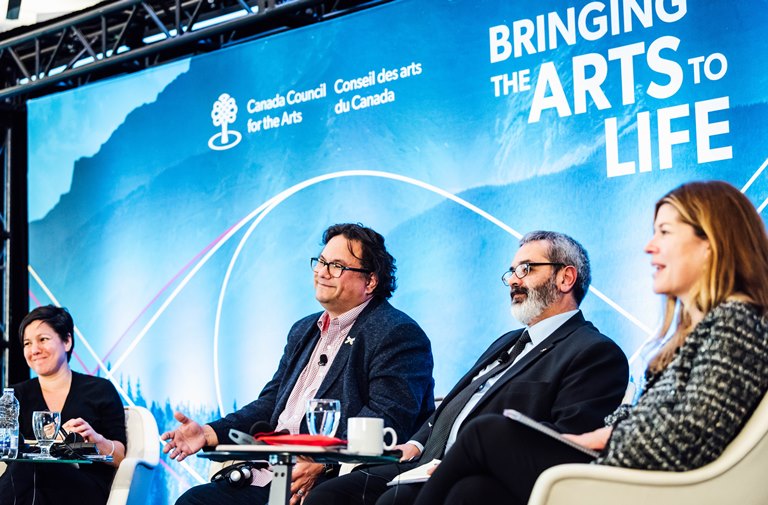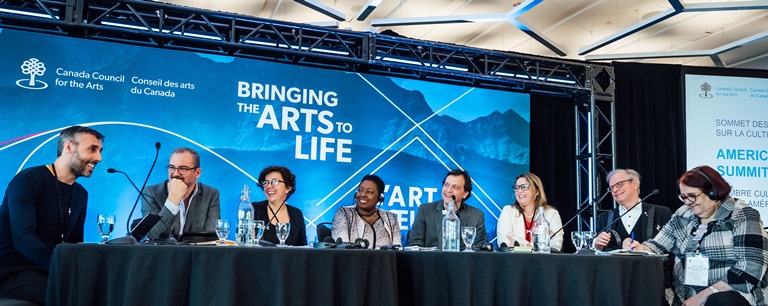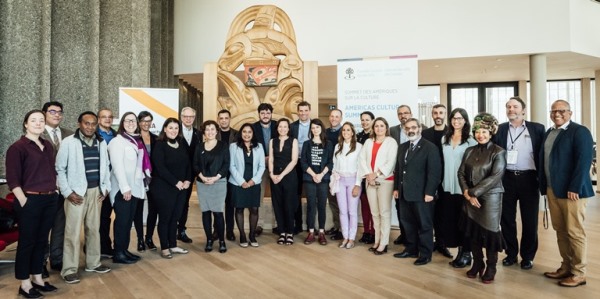Photo: Martin Lipman. Courtesy: Canada Council for the Arts | Conseil des arts du Canada
In the spirit of member-led programming, the first Americas Cultural Summit took place 9–11 May in Ottawa, Canada, hosted by the Canada Council for the Arts in partnership with the Ministry for Culture Argentina and IFACCA. Drawing on diverse perspectives from across the continent, the Summit explored the emerging concept of cultural citizenship and ways in which it can contribute to more vibrant, prosperous, and inclusive societies. We are honoured to have played a central role in the Americas Cultural Summit and the conversations it inspired, and we are pleased to share our perspective on the key issues that emerged below. We welcome you to join the dialogue as it continues to develop and to share how these themes resonate in your regional context.
Cooperation in Action
The theme of cultural citizenship was identified in response to increasing public perceptions that democratic institutions, particularly those that support arts and culture, are uniquely positioned to promote and protect cultural rights. An integral part of human rights, cultural rights guarantee that all people have the freedom to express their identity and actively contribute to the cultural life of their communities, free from discrimination. For some, the freedom to express one’s values in both public and private forums is an essential component of genuine democracy. This view of cultural citizenship sees potential in the relationship between arts and culture and truth-saying and -seeking, which can provide communities with unique critical insights into the human condition. These insights, and the processes that reveal them, may then inform the direction society takes and the kinds of investment that will generate public value for a more inclusive cross-section of people.
Others see current models of leadership as unfit for purpose within contemporary sociopolitical climates, heightening the need for public institutions to explore new ways of working and to realise the promise of cultural citizenship. As democratic institutions, public investors in arts and culture are uniquely positioned to model a new era of inclusive leadership, not only through cooperation with peer entities, but also with the citizens they serve. In times of complex challenges and marked differences, leaders around the world may find that cultural citizenship can bolster trust between governments and citizens – as well as between citizens themselves - and improve the efficacy of public institutions
Living with Complexity
These days, it is nearly impossible to avoid the sentiment that the world is changing in unprecedented ways. Despite its expansive geographic reach, the Americas Cultural Summit demonstrated that common drivers are fuelling efforts to advance cultural democracy across the continent. Globalisation, technology, climate change, and demographic shifts are reshaping communities and creating complex challenges, for which there are few solutions. An affair of consciousness appears to be underway as public institutions start to recognise the limits of top-down practices in the face of an increasingly participatory global culture.
As old systems collapse, some people respond with anxiety, beneath which is often a fear of the unknown or of being left behind. Meanwhile, others embrace change as a revitalising force that creates space to discover more transformative solutions, experimental structures, and new relationships. When these actors are connected they can exchange ideas, explore new practices, and feel more comfortable taking greater risks. From these groundbreaking efforts, a new system is born, alongside a new model of shared leadership.
The dynamic nature of today’s operating environment calls on public institutions to adopt more responsive models of leadership that navigate change by harnessing the power of inclusive participation. Rather than imposing ideas of what the future should look like, facilitative leaders create enabling conditions that empower diverse actors to work together to exchange perspectives and achieve common goals. In doing so, these individuals are learning how to tap society’s most abundant source of novel ideas—its people.
A movement is growing around the world as diverse practitioners come to appreciate the ways the arts, culture, citizenship, and democratic processes can work together to advance more vibrant and just societies. In today’s climate of change, public institutions have the opportunity to not only ensure citizens enjoy fair access to participation, but also to strengthen their capacity to engage meaningfully by helping them build new skills and relationships. This speaks to the ways institutions of power can advance cultural citizenship and human development in complementary ways. In doing so, public institutions can equip citizens with the skills needed to effectively engage in dialogue with others whose worldviews differ from their own, in order to co-create the world to which they aspire.
Against this backdrop, the inaugural Americas Cultural Summit signalled that government entities from across the continent are poised to listen to citizens and respond with fresh approaches to supporting arts and culture. By recognising citizens as essential partners in development, communities large and small are learning how to leverage local knowledge and lived experience as legitimate forms of expertise that can inspire transformative solutions. In turn, government entities have begun to understand how they can create conditions that promote cultural rights and participatory citizenship, as well as the challenges associated with the new approach.
The Art of What If?
Across the Americas, forward-looking leaders understand that society’s capacity to transcend challenges and cultivate a shared sense of belonging relies on the ability to envisage, assess, and realise alternative futures cooperatively. Throughout the first day of the Summit, speakers showed us how cultural engagement provides space – both physical and ideological – for people with different worldviews to interact, negotiate difference, develop mutual understanding, and find common cause. This process complements democratic values and the root meaning of democracy itself, which places power with the people. But the power to do what? Well, there is the rub. In order to realise the promise of democracy as a means to a more equitable future, we must first develop a shared vision of that future.
Day One of the Americas Cultural Summit tackled these questions head-on. That morning, Dr Eliza Chandler (Canada) applauded efforts to advance participatory cultural policymaking focussed on supporting artists with disabilities underway across the country. At the same time, she challenged participants to think about whose needs are privileged and how, as inclusive processes are adopted. She advised deliberate care to ‘decolonialise our thinking’ about who should participate in such processes and suggested ways to avoid tokenising the involvement of those with historically less visibility or perpetuating notions of otherness.
Dr Chandler’s fellow panellist Mauricio Delfín (Peru) built on these themes and challenged participants to think about what it means to ‘empower authentic citizen participation’ and how that differs from more transactional forms of consultation. Mr Delfín suggested that democracy provides communities with a powerful vehicle for inclusive decision-making about issues of public concern. He added that creative practices can be used to shift the atmosphere, attract new participants, and facilitate dialogue across groups to build collective capacity to affect change. However, Mr Delfín also critiqued the ways in which some participatory practices are used as a veneer for shared decision-making, which erodes trust between marginalised groups and governments. He advised public institutions to reflect on their intentions and ability to truly share power before adopting such approaches, and suggested that civil society hold them accountable.
Alonso Salazar, former mayor of Medellín, Colombia, enhanced these perspectives further by showing how cultural investments subverted the violence-based narrative that paralysed the city for decades. Speaking about cultural interventions that were co-created and co-implemented with citizens, Mr Salazar demonstrated how his administration was able to cultivate a shared sense of possibility, pride, and stewardship of both place and of each other, by enlisting citizens in the process of reimagining their shared future,. By focusing cultural investments on public works, Mr Salazar and his partners were able to reclaim public space for peaceful activity and belonging. Over time, these interventions have contributed a great deal to Medellín’s renaissance, which would not have occurred if citizens had not been recognised as essential partners in its transformation.
Each of these stories demonstrated the mutual benefit gained when public institutions embrace participatory processes and that public institutions can model a new kind of leadership and inclusive practice, by leading from a place of empathy and treating all citizens with respect and dignity.
Poetic Technologies
The discussion of inclusive participation set the stage for deeper exploration of the ways in which digital technology affects the arts and culture ecosystem, for both creators and citizens. Artist–activist Astra Taylor (USA/Canada) provided a compelling assessment of contemporary democracy and the damaging effect that highly corporatised media landscapes have on our capacity to realise its more egalitarian promise. In an era of ‘alternative facts’, Ms Taylor urged participants to consider how the arts can help us find deeper truth and promote empathy.
Democratisation of technology assumes that a more diverse range of people have access to digital tools and are empowered by their use. However, the afternoon’s speakers reminded us that technology remains only a tool: our values determine how these tools are used and the extent to which they advance cultural citizenship and greater equity. Four artists shared a rich array of examples of how values congruent with social justice are empowering their use of digital technology to create greater empathy.
American artist–educator Taeyoon Choi proposed we develop a ‘new code of ethics’ alongside our ability to code software. This code would prioritise values of inclusivity, equity, and justice within emerging art and technological forms. Work by his fellow panellists embodied this perspective and provided participants with a glimpse into what an alternative future might look like. In doing so, Mr Choi also reminded us that artists are uniquely equipped with the skills and sensitivities needed to navigate the unknown and embrace the change that surrounds us as a revitalising force.
Artist Amor Muñoz (Mexico) creates work that combines performance and experimental electronics with traditional media such as drawing and textile techniques. She shared work that highlights the inequitable conditions of factory workers on the USA–Mexico border with the aim of inspiring dialogue, learning, and social change. In a similar manner, filmmaker Michèle Stephenson (Haiti/ Panama/Canada/USA) provided a powerful example of the ways in which digital technology, historical narratives, and magical realism can come together and provide audiences with a visceral experience of racism in the southern states of the USA. For Ms Stephenson, values such as inclusivity are ‘means by which to achieve greater equity, not ends unto themselves’. Her exploration of diversity does not include putting inclusivity on a pedestal or ignoring its messy depths; rather, her work leverages the power of digital technology as a way to inspire radical empathy in service of restorative justice through deeply immersive experiences.
In the afternoon, we heard from speakers from across the Americas engaged in memory and reconciliation work. The work of truth and reconciliation focusses on addressing historic inequality and healing divisions in societies with legacies of violence and discrimination against marginalised groups. Reconciliation efforts with Indigenous peoples acknowledges ‘the urgent need to respect and promote the inherent rights of indigenous peoples which derive from their political, economic, and social structures and from their cultures, spiritual traditions, histories and philosophies’ (United Nations Declaration on the Rights of Indigenous Peoples, 2008). Day One of the Americas Cultural Summit came full circle in many ways, as we took an emotionally charged look at how the promotion and protection of cultural rights for all can begin to heal deep societal wounds.

Javiera Parada from Chile, Jesse Wente (Director, Indigneous Screen Office) from Canada, The Honourable Fernando Griffith from Paraguay and Elizabeth Silkes (Executive Director, International Coalition of Sites of Consciences)
Photo: Martin Lipman. Courtesy: Canada Council for the Arts | Conseil des arts du Canada
A common theme cut across each speaker’s words, calling for truth-telling as a precondition for reconciliation. By acknowledging the complicit role that government institutions have played in perpetuating inequity, they can play a powerful role in reconciliation processes. Furthermore, by devolving power to those with traditional knowledge and lived experience. and creating meaningful opportunities for them to shape the purpose and substance of cultural policy, public investors in the arts and culture can begin to share power in ways that promote cultural rights and advance equity. Furthermore, by looking to traditional models of inclusive governance used in Indigenous communities, public entities may find tremendous inspiration for how they might transform dominant institutions of government in the future.
Participatory Futures
If democratic processes enriched by local culture provide a more inclusive cross-section of stakeholders the opportunity to shape society collaboratively, then how far up- or downstream are citizens’ contributions applied? Building on several threads, Day Two of the Americas Cultural Summit raised critical questions about the depth and quality of participation that could - or should - be expected through cultural citizenship.

Cultural Agencies Roundtable: Creating Participatory Futures Panel
Photo: Martin Lipman. Courtesy: Canada Council for the Arts | Conseil des arts du Canada
The morning’s long table discussion revealed some of the pressures public institutions experience as they adopt more participatory approaches, including challenges to expectations of how long it should take to develop cultural policy, what policies should include, who should benefit, and why. Transformative approaches invite public institutions to reflect on the efficacy of their structures and processes, and where necessary, make them more porous, accessible, and responsive to local needs. However, creating greater opportunity does not guarantee citizen participation. Citizens and government actors alike may be deterred from participating in collaborative governance if there is a lack of trust, engagement and/or communication; while some citizens may encounter barriers to engagement if they lack – or are seen to lack – experience engaging with government actors. As such, speakers invited public institutions to consider how they could invest in building citizens’ appetite to engage and address their capacity to do so in meaningful ways. Speakers from across the Americas demonstrated how they are beginning to transform systems from the inside out by adopting a call-and-response approach to policymaking,
In keeping with the collaborative spirit of the Summit’s overarching theme, the final day of the Summit provided participants with time to engage in smaller group discussions. The fruits of those conversations will be shared with our network in the days to come.
The Path Ahead
In a world that’s increasingly divided and uncertain, society needs creative approaches that promote inclusive dialogue, harness the cultural vitality that exists in all places, and leverage the solidarity that springs forth when diverse individuals come together to co-create the future. As powerful forces continue to reshape the role of public institutions, creative practitioners are uniquely positioned to directly affect the direction of society’s development in ways that build citizen power and position cultural considerations at the heart of inclusive governance.
Join the conversation at #culturecultura18


